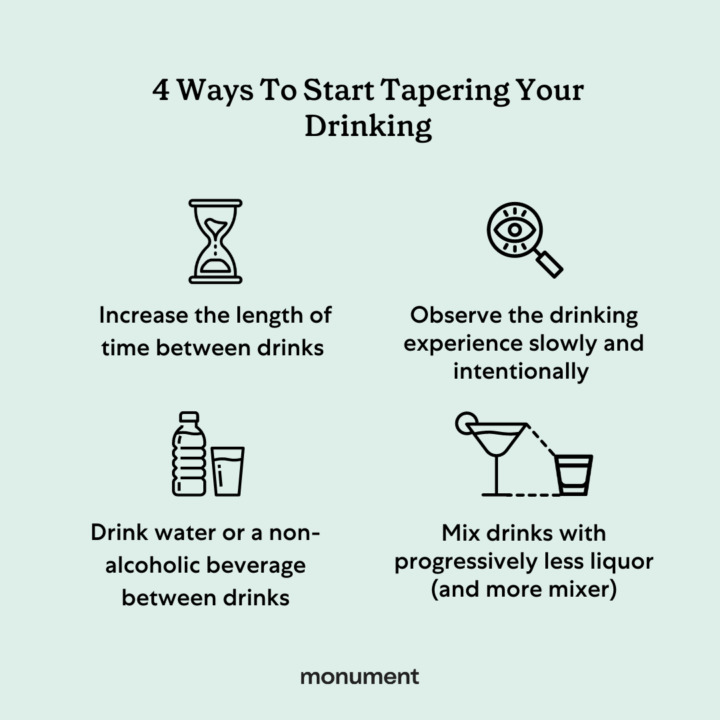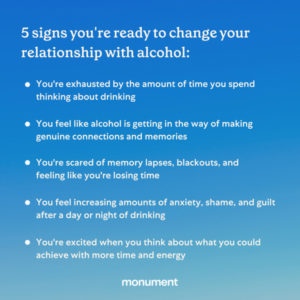As a Certified Professional Recovery Coach, I often speak with people who want to wean off alcohol. The thought of abstaining from alcohol completely can feel daunting, and in some cases, it can even be dangerous without medical supervision. Cutting back can feel like a more realistic goal. But what does weaning or tapering off alcohol mean? How do you safely cut back? How long does it take? Below I share some key information so you can determine if weaning off alcohol is right for you.
Weaning (or Tapering) Off Alcohol: What it Means
Weaning or tapering off alcohol means slowly reducing your alcohol intake over a period of time. The goal is to drink less, and for many, steadily reduce alcohol consumption down to zero. People use tapering down as a way of easing their mind and body into sobriety.
After prolonged alcohol use, your body can come to rely on alcohol for normal functioning, and suddenly going without it can cause potentially dangerous withdrawal symptoms. This phenomenon is often described as “alcohol dependence.” The most common more mild withdrawal symptoms include headaches, anxiety, and sleep disturbances. Severe symptoms include seizures and hallucinations.
Working with a medical professional to taper your alcohol consumption can help the likelihood and severity of alcohol withdrawal symptoms. Instead of quitting alcohol cold turkey, you can steadily reduce your consumption so that your body has time to gradually readjust to absence of alcohol. It’s important to note that stopping drinking can be dangerous and even life-threatening. It’s vital to speak with a medical professional before you begin weaning off alcohol to ensure you have a plan to do so safely. For some, medically-supervised detox may be necessary.
How to Taper or Wean off Alcohol
There are several different strategies people use in order to taper their alcohol use. I’m going to share a few of the most effective strategies, which you can discuss with your medical provider. If you’re looking for a provider specifically experienced in helping people stop drinking, you can connect with a physician at Monument. Here are just a few of the ways you can wean off alcohol:
Reduce Your Number of Drinks Per Day
A popular way to taper off alcohol is to gradually reduce the number of drinks you consume over a period of time. For example, if you normally drink 6 glasses of wine each night, you can try reducing that to 5 glasses of wine a night. After several days of 5 glasses of wine, you can reduce that down to 4. Eventually, after a period of time, you will have tapered down to zero drinks. If you’re interested in medication-assisted treatment, medication to curb cravings can be a helpful tool for reducing your consumption.
Increase Time Between Drinks
Another way to think about reducing your drinks per day is to continue to increase the time between each drink. Instead of limiting your number of drinks, you can challenge yourself to drink more slowly. For example, some people limit themselves to one drink per hour, and may be working towards one drink every hour and a half. Some people also alternate alcoholic drinks with non-alcohol drinks, which is a great way to pace your alcohol consumption while always having something in your hand. Other people choose to wean off alcohol by mixing ‘weaker’ drinks. They measure an amount of liquor and then use that amount for two drinks instead of one. These strategies are sometimes referred to as a “substitution taper.”
Practice Mindful Drinking
Another approach that can help you slowly reduce your alcohol consumption is to practice “mindful drinking.” This is a strategy where you bring greater awareness to the actual experience of drinking by utilizing specific mindfulness techniques. Over time, this can help you slow down and make more intentional choices about how much you’re drinking. You can read all about mindful drinking in this article by a licensed therapist at Monument.
Set a Schedule and an End Date
Whatever method you use to taper down, your plan should also be approved and monitored by a healthcare profession to ensure your safety. You will also work together to align on a schedule. Tapering can be done over a period of days or weeks. Working with a physician on the Monument platform can help determine what timeline will work for you based on your past drinking habits and risk of withdrawal. Whatever schedule is chosen, it’s important to commit so you can build upon your progress and avoid withdrawal symptoms as much as possible.

How Long Does it Take to Wean Off Alcohol?
The tapering down process can take place for the first several weeks or even months of the alcohol recovery timeline. There are many factors that can affect how long weaning off alcohol will take. Some people detox for several days in a medical facility. Other people use medication-assisted treatment, which can help reduce alcohol cravings as you cut back. Lastly, engaging in alcohol therapy can also make a major difference in your healing journey. A therapist will work with you to create a personalized plan for cutting back and provide ongoing guidance and accountability.
Can Tapering Down Alcohol Use Reduce Withdrawal Symptoms?
In most cases, yes. The goal of tapering down is to make a gradual change while causing less stress on your body, both physically and emotionally. Withdrawal symptoms can vary in severity and depend on many factors, such as drinking history, metabolism, age, medical condition, what other substances or medication you take, and more. Because everyone’s body reacts differently, there’s not a lot of research that proves tapering can decrease the effects of alcohol withdrawal. For many, it can make these symptoms more manageable. Others report that it can cause symptoms to feel prolonged.

Tapering Down vs. Quitting Cold Turkey
For those at risk for severe withdrawal symptoms, medically-supervised detox is often the safest choice for beginning their sobriety or moderation journey. Others may discover after consulting with a doctor that it’s safe for them to quit alcohol cold turkey if they choose to. However, they may still decide that tapering down feels most achievable for them. If you’re not sure if cold turkey or tapering is right for you, you can join the Monument Community to hear from others who have confronted similar questions.
Mental and Physical Impacts of Weaning off Alcohol
Mental Health
Reducing alcohol intake can have significant positive effects on mental health. As you reduce your alcohol consumption, you may notice improvements in mood, anxiety, and overall mental well-being. However, the initial stages of tapering can also bring emotional challenges, as your body and mind adjust to lower levels of alcohol. Engaging in therapy during this time can provide essential support and coping strategies.
Physical Health Benefits
Gradually reducing alcohol intake can lead to various physical health benefits. These can include improved liver function, better sleep quality, enhanced cognitive function, and a lower risk of developing alcohol-related diseases. As your body detoxifies and heals, you may experience increased energy levels and overall well-being.
Is Weaning Off Alcohol Right For Me?
This is a highly personal decision, which can be made through self-reflection, and with the support of a medical professional and your peers. If it’s safe for you to quit cold turkey, you may find that cutting alcohol out entirely from the start helps you clearly uphold your boundaries. Or, you may find that quitting all at once is too drastic and decide to start by practicing harm reduction.
As you navigate this question, it can be helpful to think about how you typically prefer to approach change. Metaphorically speaking, do you like to dip your toe in first, or cannonball right in? As long as safety precautions are taken, there’s no wrong way to begin a sobriety or moderation journey. This journey is often non-linear, and your goals can change over time.
Whether you decide to taper down your alcohol use or safely begin with abstinence, having a sobriety toolkit and support system will be the most important factor towards success in reaching your goals. At Monument, you can join a free community of over 60,000 members also working to change their relationship with alcohol, and explore treatment options like therapy and medication to stop drinking. Getting curious about a life without alcohol is already an incredible step, and a healthier lifestyle is within reach.
FAQ: Weaning Off Alcohol
Q: What is the safest way to wean off alcohol? A: The safest way to wean off alcohol is under the guidance of a healthcare professional. They can help create a personalized plan that gradually reduces alcohol intake while monitoring for withdrawal symptoms.
Q: How long does it take to wean off alcohol? A: The time it takes to wean off alcohol varies depending on individual factors, including the amount and frequency of alcohol consumption. It can take several weeks to months to safely taper down.
Q: Can I wean off alcohol without medical supervision? A: While some people may be able to taper off alcohol without medical supervision, it is generally recommended to seek professional guidance to ensure safety and manage withdrawal symptoms effectively.
Q: What are the benefits of tapering off alcohol? A: Benefits of tapering off alcohol include reduced risk of withdrawal symptoms, improved physical and mental health, better sleep quality, and a lower risk of developing alcohol-related diseases.
Q: What are the risks of quitting alcohol cold turkey? A: Quitting alcohol cold turkey can lead to severe withdrawal symptoms, including seizures and hallucinations. It is important to consult a healthcare professional to determine the safest approach for you.
Q: How can I stay motivated while tapering off alcohol? A: Staying motivated can be achieved by setting clear goals, tracking progress, seeking support from friends and family, and joining a supportive community
